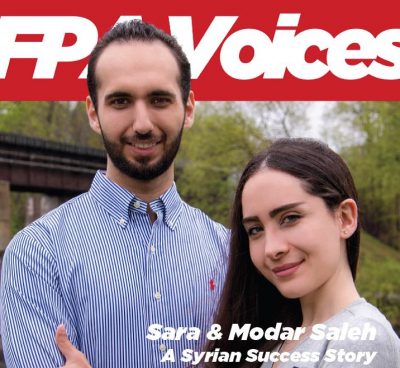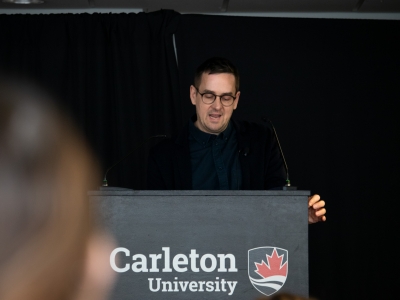 Sara Saleh, Combined Honours, Bachelor of Arts, Communication Studies and Political Science
Sara Saleh, Combined Honours, Bachelor of Arts, Communication Studies and Political Science
Modar Saleh, Bachelor of Arts, Economics
In November of 2011, siblings Sara and Modar Saleh received their international student visas at the Canadian embassy in Damascus. Soon after, the embassy was closed and never reopened. This year, they are graduating with degrees from Carleton: Modar with a good standing and Sara with a High Distinction designation.
What was happening in Syria when you decided to study abroad?
Sara: We applied to Carleton University in early 2011, before the Syrian crisis unfolded. Studying abroad meant having better post-secondary education and better opportunities for entering the labour market. I chose Carleton because it has one of the top schools for journalism and communication studies and has educated many leading personalities in the field.
However, we had no idea what was about to happen in our country when we applied here.
You grew up in Damascus, Syria. Did you see any signs that a protracted conflict was brewing?
Sara: Damascus has always been a safe city—a city where you can walk home at 3 a.m. without worrying about anything. Before the crisis, Syria was ranked one of the safest countries in the world. So there were no indicators—not even alarming signs—of what was about to happen.
The day I wrote my grade 12 exams, the high school was protected by soldiers to ensure we were secured inside. This was the first time I came across a sign of something unusual, something we weren’t used to seeing back then.
Modar: I was studying business administration at a university about 50 kilometers away from the city of Daraa. I eventually stopped attending my classes because that city was the scene of tensions and it was no longer safe to go to university. At that time, it was hard to understand exactly what was going on.
What was your transition like when you arrived at Carleton?
Modar: I found it difficult at the beginning because my spoken English was not that good. I didn’t feel comfortable enough to attend my professors’ office hours because I couldn’t express myself well.
But I received a lot of help from the Student Academic Success Centre, the International Student Services Office and language workshops offered in the library. “As international students that’s one of the reasons we hose Carleton.”
By second year, my English improved significantly and I made friends. I also started visiting my professors and TAs during their office hours so my grades really went up. I’m now working on developing my French.
Sara: “Transition” is a tricky word and world. For me, it has been an ongoing process. At the beginning you resist transition because you mistakenly equate it with relinquishing your homeland identity. Carleton helped me celebrate rather than resist my differences and it made me explore this new world.
What were your favourite courses?
Sara: One of my favourite courses was on communication and diasporas, taught by Professor Karim Karim. In this class, I had the opportunity to bring back my homeland memories in the form of a research paper.
Modar: When I first came to Canada, the Canadian dollar was worth about the same amount as the U.S. dollar and then it dropped, which made me want to learn more about monetary policy. My favourite course on that subject was taught by Raúl Razo-Garcia, an Assistant Professor in the Department of Economics.
What are your plans for the future?
Modar: Long term, I’m considering doing a Master’s degree in Economics and I’m currently planning on becoming a CPA.
Sara: I’m starting a summer job with the The International Program for Development Evaluation Training (IPDET) and I’ll continue to volunteer for MP Niki Ashton on Parliament Hill. I’m planning on graduate studies, as well, but still deciding between communications and political science.
Monday, September 12, 2016 in Communication and Media Studies, Department of Economics, Department of Political Science, FPA Voices, International, People
Share: Twitter, Facebook



